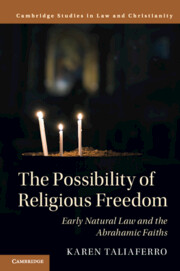Book contents
- The Possibility of Religious Freedom
- Law and Christianity
- The Possibility of Religious Freedom
- Copyright page
- Dedication
- Contents
- Preface
- Acknowledgments
- 1 Religion and Law in Late Modernity
- 2 Antigone: The Tragedy of Human and Divine Law
- 3 Maimonides’ Middle Way: Teleology as a Guide for the Perplexed
- 4 Between Sharīʿa and Human Law: Ibn Rushd and the Unwritten Law of Nature
- 5 Arguing Natural Law: Tertullian and Religious Freedom in the Roman Empire
- Conclusion
- Epilogue
- Bibliography
- Index
Conclusion
Natural Law, Modernity, and Aporia
Published online by Cambridge University Press: 07 October 2019
- The Possibility of Religious Freedom
- Law and Christianity
- The Possibility of Religious Freedom
- Copyright page
- Dedication
- Contents
- Preface
- Acknowledgments
- 1 Religion and Law in Late Modernity
- 2 Antigone: The Tragedy of Human and Divine Law
- 3 Maimonides’ Middle Way: Teleology as a Guide for the Perplexed
- 4 Between Sharīʿa and Human Law: Ibn Rushd and the Unwritten Law of Nature
- 5 Arguing Natural Law: Tertullian and Religious Freedom in the Roman Empire
- Conclusion
- Epilogue
- Bibliography
- Index
Summary
The Conclusion explores the wider implications for human rights more generally of the theory of law proposed in the book, including responses to possible objections. It also brings in other disciplines’ use of the study of nature and its role in ethics and normative political theory, revealing how and why a return to traditions of natural law is a viable project in contemporary scholarship. Finally, it explores the more concrete formulations of policy, legislation, and jurisprudence that would flow from the proposed theory of law.
- Type
- Chapter
- Information
- The Possibility of Religious FreedomEarly Natural Law and the Abrahamic Faiths, pp. 128 - 141Publisher: Cambridge University PressPrint publication year: 2019

